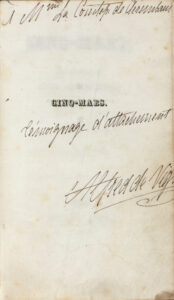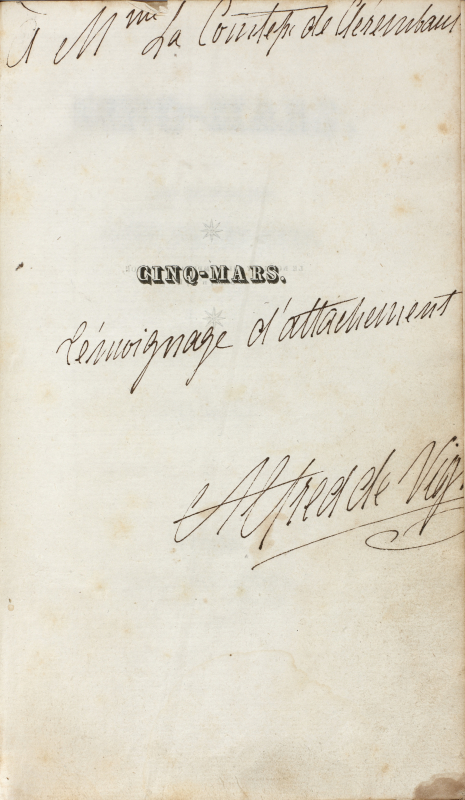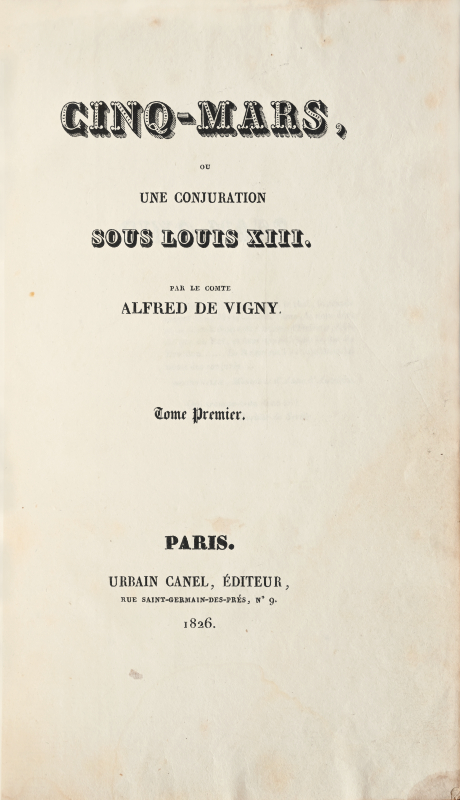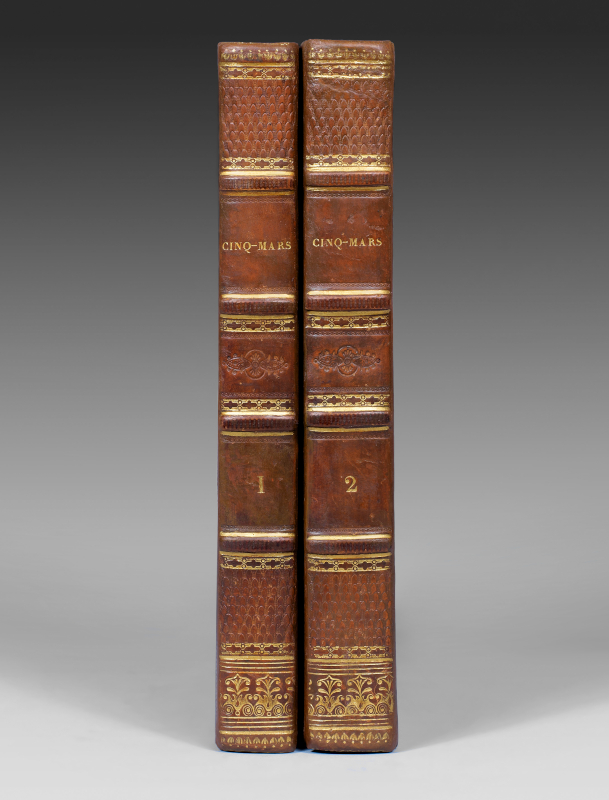Paris, Urbain Canel, 1826.
2 parts in 2 volumes 8vo of: I/ (1) l.bl., (2) ff. 411 pp., (1) p.; II/ (2) ll. 491 pp., (1) p.
Bound in full glazed calf, gilt fillet and blind-stamped fillets around the covers, blind-stamped fleurons decorative motif in the center of the covers, finely decorated ribbed spine, decorated edges, gilt edges, rare foxing. Contemporary binding.
202 x 125 mm.
First edition of this “extremely rare work” by Alfred de Vigny, the “first French historical romance”. (Carteret, II, P. 452).
Vicaire, VII, 1053; Clouzot, p. 274.
“Unusual” emphasizes Clouzot.
Cinq-Mars, published in 1826, was considered the first great French historical novel.
Vigny places illustrious men in the foreground, a process that contributes to create a hybrid genre between the novel and history, but also to create a gap between the historical fact and the action.
Cinq-Mars crystallizes the thorny problem of the relationship between history and fiction. Vigny defends the idea of a story that “perfects the event to give it a great moral significance“.
Answering the critics who reproach him for his deviations of imagination and poetry, he affirms that the freedom he takes with history is “the freedom that the Ancients carried in history itself“, because “in their eyes history was also a work of art“.
The action of the novel is set in the early seventeenth century and takes place in the court of King Louis XIII. It tells the story of the Marquis de Cinq-Mars who, a man of bravery and firmness, was able to win the esteem of the king by organizing an opposition movement to the Cardinal of Richelieu. However, manipulations, plots, and various treacheries finally led the king to abandon his champion and allowed Richelieu to triumph.
By choosing this historical episode and by magnifying the character of Cinq-Mars, Vigny deliberately took sides in favor of an aristocracy that remained faithful to the chivalric ideal.
Cinq Mars, the king’s favorite, embodies the ancient nobility sacrificed by Richelieu to the absolute and unitary monarchy.
By reviving this authentic conspiracy hatched in 1639, Vigny fulfills a childhood desire: “After reading the ‘Memoirs’ of the Cardinal de Retz, it occurred to me to write a History of the Fronde. I was fourteen years old… It seemed to me since to discharge a true debt of friendship when I wrote ‘Cinq-Mars’… and in 1824 in Oloron in the Pyrenees, I composed entirely and wrote on a sheet of paper the whole plan of ‘Cinq-Mars’. There is no book that I have meditated on longer and more seriously… It was only in 1826 that I began to write the book from one end to the other, and, as they say, with a single ink“. (Vigny, Journal d’un poet, May 1837).
The dazzling literary success of ” cinq-Mars ” was going to muzzle the critics who qualified the writer of amateur and to allow this one to impose itself to the French public.
Hugo wrote in the Quotidienne of July 30, 1826 a glowing article about the present novel:
“Admirable! The crowd will read it as a novel, the poet as a drama, the statesman as a history!”
Precious copy offered by the author to his Cousine, the countess of Clerembaut, bearing this dedication on the half-title: “To Madame la Comtesse de Clérembaut. Testimony of attachment. Alfred de Vigny “.
The Countess of Clérembaut is the wife of the Colonel Count of C., the cousin of Vigny. Vigny and the countess were very close and maintained a regular correspondence.
A fine copy of this very rare first edition, of a touching provenance, covered with a fine and elegant romantic binding.
Copies in contemporary bindings are very rare.
According to our research, only 3 French public institutions possess this rare original: B.n.F., Bibliothèque de Lille and Bibliothèque Sainte-Geneviève, Paris.
The last copy listed on the international market, the Hayoit copy, although in a very later binding, was sold 22 years ago for 5 000 € (Paris, Sotheby’s, Hayoit sale of June 29, 2001, lot 330).



